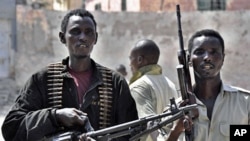Remaining residents within Somalia's battle-torn capital are fleeing as rebel and government forces prepare for new clashes. The Western-backed Mogadishu government has announced its intention of launching an offensive against the Islamist opposition.
For weeks, the Transitional Federal Government has been promising to drive back the rebel forces who control much of Mogadishu and most of southern Somalia. The threat was reiterated by the the nation's foreign affairs minister during a visit to Japan. He said the offensive would begin "very very soon."
Those in the capital city say clashes appear imminent, with the government army positioning to attack, and reinforcements reportedly flowing into the shifting rebel lines.
The government has begun to shell al-Shabab-controlled areas. Some reports say there have civilians have been killed in the shelling.
Hundreds are said to be fleeing the city in expectation of major violence, most heading to the Afgoye Corridor about 30 kilometers south of Mogadishu. The camp there is thought to house the most concentrated number of displaced people in the world.
The spokesman for the insurgent Islamist group al-Shabab, Sheikh Ali Mohamud Rage, told reporters his fighters are ready for any attack, saying the government would be unseated from power. The group regularly denounces the official administration for being un-Islamic.
The official government is headed by Sheikh Sharif Ahmed, a former insurgent leader who was elected by the nation's parliament in early 2009.
Most of his tenure in power has been marked by a strengthening Islamist insurgency, composed of many of his former friends and allies. Most powerful and most radical of the rebel groups is al-Shabab, thought by Washington to have links to al-Qaida. Fighting alongside, and occasionally against, is Hizbul Islam, a conglomerate of smaller rebel factions.
The embattled administration has been buffered from the insurgents by an African Union peacekeeping force composed of Ugandans and Burundians, which protects about 10-square blocks that includes the presidential palace and the airstrip.
The government has for months lingered in inaction as the rebels have entrenched their control throughout much of the country. But its officials say the time has come for retaliation.
A recent Reuters report quoted an anonymous Kenyan official as saying 2,500 Somalis have just finished military training in northeastern Kenya and are being deployed with the Somali military. Kenya, not eager to start a direct conflict against the Islamists, and has denied the accuracy of such reports
But some doubt whether the Somali army is capable of conducting the long-promised counter-insurgency campaign. The army is criticized as being poorly funded and undisciplined. Soldiers complain of late pay and a lack of equipment.
The Mogadishu government says support from the international community has been inadequate. In addition, the administration is plagued by a perception of being corrupt and inept.




